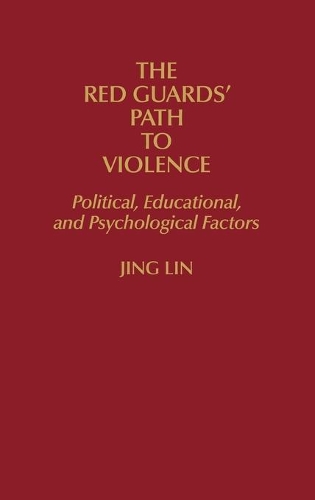
The Red Guards' Path to Violence: Political, Educational, and Psychological Factors
(Hardback)
Publishing Details
The Red Guards' Path to Violence: Political, Educational, and Psychological Factors
By (Author) Jing Lin
Bloomsbury Publishing PLC
Praeger Publishers Inc
30th August 1991
United States
Classifications
Tertiary Education
Non Fiction
Revolutionary groups and movements
Revolutions, uprisings, rebellions
Far-left political ideologies and movements
951.056
Physical Properties
Hardback
200
Width 156mm, Height 235mm
510g
Description
A philosophical analysis informed by history, this work examines the reasons for the highly destructive behaviour of the Red Guards in the early part of China's Cultural Revolution. By probing the political, education, and psychological factors influencing the Red Guards, Jing Lin sheds light on how teenagers and young adults were able to justify violence in the name of class struggle and human rights. She concludes that non-critical, categorical thought - buttressed by the political and educational systems - was pivotal. Jing Lin introduces the work with a discussion of democratic and non-democratic thought, and of the Red Guards' views about class struggle, authority and justice. She then examines the theory behind Mao's totalitarian rule. Chapter Three is devoted to schools, and their decisive role in developing the Red Guards. The psychology of the Red Guards follows: Lin details how concepts of the proletariat, class enemies, and intellectuals nurtured habits of aggression and obedience. In concluding, Lin suggests how to foster critical and democratic thinking in Chinese education. This book is aimed at students of Chinese history, revolution, political psychology, and education.
Reviews
Jing Lin was born and raised in China, and lived there for more than 20 years before moving to North America for her doctoral study. Drawing on her experiences in China as a student and university instructor, Lin offers an enlightening reflection on several elements that formed a generation's thinking. She focuses on political, educational, and psychological factors in explaining the Red Guards' aggression toward class enemies' and their obedience toward Mao during the Cultural Revolution, although other influences may have been equally important. She believes that noncritical categorical thinking had taken over the Red Guards, lending to their destructive behavior. The book explores the chief features of the Red Guards' thinking and behavior and examines the impact of political, educational, and psychological factors on them. In addition, Lin constructs a model of the development of the Red Guards' thinking and considers alternative ways in which Chinese education today might foster critical and democratic thinking. Notes and a brief bibliography. Recommended for college, university, and public libraries.-Choice
"Jing Lin was born and raised in China, and lived there for more than 20 years before moving to North America for her doctoral study. Drawing on her experiences in China as a student and university instructor, Lin offers an enlightening reflection on several elements that formed a generation's thinking. She focuses on political, educational, and psychological factors in explaining the Red Guards' aggression toward class enemies' and their obedience toward Mao during the Cultural Revolution, although other influences may have been equally important. She believes that noncritical categorical thinking had taken over the Red Guards, lending to their destructive behavior. The book explores the chief features of the Red Guards' thinking and behavior and examines the impact of political, educational, and psychological factors on them. In addition, Lin constructs a model of the development of the Red Guards' thinking and considers alternative ways in which Chinese education today might foster critical and democratic thinking. Notes and a brief bibliography. Recommended for college, university, and public libraries."-Choice
Author Bio
JING LIN is Assistant Professor of Administration and Policy Studies in Education at McGill University, Montreal. She has published and presented papers on rural, vocational, and teacher education in China.
